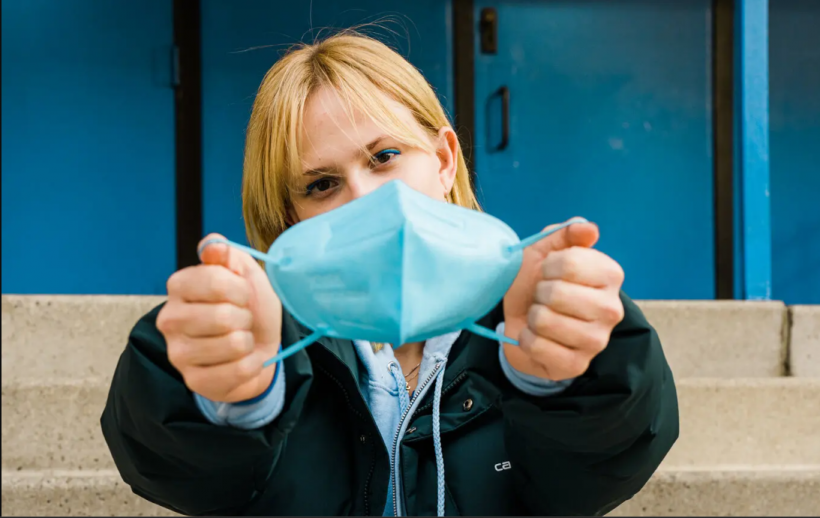During the pandemic, face masks served as effective barriers for Tanushri and her classmates in NYC. Besides safeguarding against the transmission of Covid-19, the masks concealed various changes that teenagers may want to hide, such as braces, pimples, acne scars, and budding facial hair. Now that the mask mandate has been lifted in public schools in the city, students are facing familiar anxieties about their appearance and the need to fit in.
As they get a clearer view of each other's faces, they're discovering who among them has been "mask fishing," or using masks to hide their true appearance. The term is derived from "catfishing," which refers to misleading someone about one's identity on the internet. For a generation that has grown up with smartphones and social media, it's a fitting reference, according to the New York Times.
A study suggests that individuals who consider themselves attractive are less likely to continue wearing face masks after the Covid-19 pandemic. The researchers carried out three surveys to gather information on people's self-perceived attractiveness and their intentions to wear masks in different situations.
'New Form of Catfishing'
The results showed that young and middle-aged Americans who view themselves as good-looking feel that wearing a mask obstructs their ability to make a positive impression on others. Contrarily, individuals who don't consider themselves attractive embrace the idea that masks can enhance their appearance. This follows a significant research study that determined masks had "limited to no impact" on the rates of COVID-19 infection or death.
The face mask, originally designed for antiviral protection, has turned into a symbol of a highly contentious cultural conflict in the United States. Despite limited evidence demonstrating the efficacy of masks in preventing infections on a widespread level, officials have imposed mask mandates across the country.
In states controlled by Democrats, schools recently made it mandatory for students to wear face masks, and the Centers for Disease Control and Prevention (CDC) continues to advise Americans to use them in high transmission areas such as public transportation.
Elderly people and those with weakened immune systems are also advised to take precautions like wearing masks. Despite President Biden declaring the Covid-19 pandemic to be "over" last year, up to 40% of Americans still wear masks on occasion. Researchers from Seoul National University in South Korea aimed to examine the impact of self-perceived attractiveness on mask-wearing intentions.

Clementine Elorriaga has become known at school for color-coordinated masks. “I’m trying to find a nice green one because I like wearing green outfits,” she said, “but I haven’t found the mask that feels reliable that’s green" Unmasked the new trend of 'mask fishing' among teenagers in post-pandemic New York City.
Self-Perceived Attractiveness
They conducted three experiments on Americans sourced from Amazon Mechanical Turk, a crowdsourcing platform for businesses. The average age across all the studies was 33 years old, with men comprising approximately 44% of each study group. The most noteworthy discovery came from the third study, which involved 442 individuals, half of whom were informed that they would be walking their dog and the other half were informed that they were going for a job interview.
Daily Mail reported that the respondents were asked: "In this scenario, do you think others will perceive you as more attractive with a face mask?" and "How much do you want to make a good first impression on others?" The individuals who were going for a job interview cared more about whether wearing a mask would affect their facial attractiveness.
In the first study, 244 participants were involved. They rated their facial attractiveness and then imagined a scenario where they were invited for a job interview at a company they were very interested in. They were then asked: "Do you think the interviewers will perceive you as more attractive with a face mask?" and "If wearing a face mask is optional in this interview session, would you wear a face mask during the company interview?"
Wearing Mask During Interview
Individuals who rated themselves as very attractive were less likely to say "yes" to wearing a face mask during the job interview. They were also less likely to believe that wearing a mask would enhance their appearance, which further reduced their intention to wear a mask during the interview.
In a subsequent study, 344 individuals who imagined themselves going for a job interview at a well-respected company were asked: "Do you think the interviewers will perceive you as more [trustworthy/competent/attractive] with a face mask?" Those who answered "yes" to these questions were more inclined to wear a mask during the interview.
The authors of the study concluded that self-perceived attractiveness significantly affects the intention of wearing masks due to the belief that masks improve appearance in the post-COVID-19 pandemic era. The study found that wearing masks has changed from being a means of self-protection during the pandemic to a way of self-presentation in the post-pandemic era. The results were published in the Frontiers in Psychology journal.
RELATED ARTICLE: Face Mask with Sensor Can Detect COVID-19 and Flu in 10 Minutes
Check out more news and information on Face Masks on Science Times.














